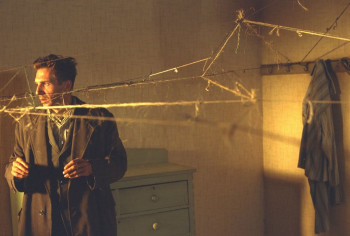 It is a car salesman that carries writer/director Kirt Gunn’s Lovely by Surprise on his shoulders until the movie blossoms. To his credit, Bob doesn’t actually sell cars. In the automobile-sales process, he dispenses hackneyed life advice, admonishing his customers that they need to spend more time with their families, and do they really want to part with that old clunker, filled as it is with memories? He is played with sincerity by Reg Rogers, in the sense that Bob means everything he says. But there’s a fakeness, a performance, about Bob – a smiling, cheery devil-may-care mask that makes him both inscrutable and intensely compelling. A genuinely independent movie, Lovely by Surprise hit DVD this week after playing the festival circuit, and what’s surprising is that it’s as successful as it is.
It is a car salesman that carries writer/director Kirt Gunn’s Lovely by Surprise on his shoulders until the movie blossoms. To his credit, Bob doesn’t actually sell cars. In the automobile-sales process, he dispenses hackneyed life advice, admonishing his customers that they need to spend more time with their families, and do they really want to part with that old clunker, filled as it is with memories? He is played with sincerity by Reg Rogers, in the sense that Bob means everything he says. But there’s a fakeness, a performance, about Bob – a smiling, cheery devil-may-care mask that makes him both inscrutable and intensely compelling. A genuinely independent movie, Lovely by Surprise hit DVD this week after playing the festival circuit, and what’s surprising is that it’s as successful as it is.
 Why does nobody take the frogs seriously? Why does nobody question them? In Paul Thomas Anderson’s Magnolia, the cataclysmic, apocalyptic rain of frogs seems casually accepted. Nobody says: “That’s some fucked-up shit, those frogs.”
Why does nobody take the frogs seriously? Why does nobody question them? In Paul Thomas Anderson’s Magnolia, the cataclysmic, apocalyptic rain of frogs seems casually accepted. Nobody says: “That’s some fucked-up shit, those frogs.”
 After watching David Cronenberg’s Spider, I was acutely underwhelmed and disappointed. It could be that the movie’s impact on my first viewing – akin to dropping a light object onto a feather pillow – was a function of overblown expectations. Or it could be that the movie was designed to end with more of a whimper than a bang.
After watching David Cronenberg’s Spider, I was acutely underwhelmed and disappointed. It could be that the movie’s impact on my first viewing – akin to dropping a light object onto a feather pillow – was a function of overblown expectations. Or it could be that the movie was designed to end with more of a whimper than a bang. It is a car salesman that carries writer/director Kirt Gunn’s Lovely by Surprise on his shoulders until the movie blossoms. To his credit, Bob doesn’t actually sell cars. In the automobile-sales process, he dispenses hackneyed life advice, admonishing his customers that they need to spend more time with their families, and do they really want to part with that old clunker, filled as it is with memories? He is played with sincerity by Reg Rogers, in the sense that Bob means everything he says. But there’s a fakeness, a performance, about Bob – a smiling, cheery devil-may-care mask that makes him both inscrutable and intensely compelling. A
It is a car salesman that carries writer/director Kirt Gunn’s Lovely by Surprise on his shoulders until the movie blossoms. To his credit, Bob doesn’t actually sell cars. In the automobile-sales process, he dispenses hackneyed life advice, admonishing his customers that they need to spend more time with their families, and do they really want to part with that old clunker, filled as it is with memories? He is played with sincerity by Reg Rogers, in the sense that Bob means everything he says. But there’s a fakeness, a performance, about Bob – a smiling, cheery devil-may-care mask that makes him both inscrutable and intensely compelling. A  The morning after the Red Sox won the 2007 World Series (following two miserable seasons of championship drought), two people approached me in McDonald’s. I was wearing a Red Sox shirt. We were in northern Arkansas, beginning an 11-hour drive north after a weekend of wedding festivities. Incidentally, I eat at McDonald’s about as often as the Red Sox win the World Series.
The morning after the Red Sox won the 2007 World Series (following two miserable seasons of championship drought), two people approached me in McDonald’s. I was wearing a Red Sox shirt. We were in northern Arkansas, beginning an 11-hour drive north after a weekend of wedding festivities. Incidentally, I eat at McDonald’s about as often as the Red Sox win the World Series. In April, Rick Moody fulfilled a fantasy that many artists surely have: He delivered a pie to the face of one of his critics. Moody is probably best known as the author of the 1994 novel from which director Ang Lee’s The Ice Storm was adapted. But he’s also famous in some circles for nine words written about him: “Rick Moody is the worst writer of his generation.”
In April, Rick Moody fulfilled a fantasy that many artists surely have: He delivered a pie to the face of one of his critics. Moody is probably best known as the author of the 1994 novel from which director Ang Lee’s The Ice Storm was adapted. But he’s also famous in some circles for nine words written about him: “Rick Moody is the worst writer of his generation.”